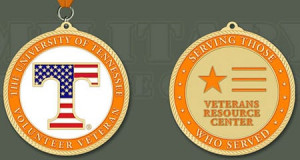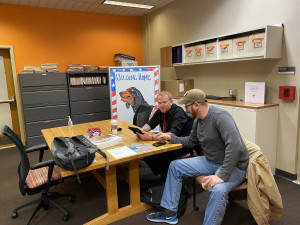Something that is often not thought about is communication with veterans. As this page will show, there are drastic differences between civilian and veteran lifestyles. Because a veteran’s life is so different, one must take that into consideration when communicating with a veteran who has returned to civilian life. Veterans are everywhere, whether they be a student veteran, retired veteran, or someone who is intermittently home from deployment. Below you will find some differences in leadership styles, some problems that veterans have to go through when returning to civilian life, information on transitioning back into civilian life, culture shock and PTSD, and then finally some information on veterans in the workplace and what civilians can do to make a returned veteran’s experience better.
For more information and resources for veterans please check out veterans.utk.edu or stop by the veterans resource center.
Leadership Style Differences Between Civilians and Veterans
Civilian Leadership
- In civilian life, leadership depends on the overall organizations mission and values.
- In civilian life, leaders push problems away because they do not want to deal with the situation right off the bat.
- Individuals in civilian life have a harder time taking leadership roles.
- Instead of applying themselves by actions, civilians apply themselves moreso with words.
- When a problem happens in civilian life, leaders do not always like to take responsibility.
- Most civilians don’t have leadership skills that was taught to them. It is self learned, which does not show leadership in a lot of aspects and can be problematic.
- Civilians in leadership roles do not have to be as detailed when it comes to their employee’s personal lives.
Military Leadership
- When there is an issue or miscommunication, the veteran who is in a leadership role will confirm the issue and handle the situation right on the spot, rather than waiting for someone else to fix the issue.
- When issues occur in the military and they are not handled right away, it falls on the leaders, even if they are not involved in the situation. It is their responsibility to fix the issue at hand.
- In military life, leadership depends on the specific branch and chain of command based on the training and creeds that military members agree on.
- In military life, leadership is based on certain principles that shape the entire unit. These principles / goals can change depending on the branch of military and their desired goals.
- Military members who transition into civilian life want leadership roles because they have a different mindset after leaving the military.
- The leadership in the military trains veterans for future inquiries where leadership is needed. For example, if an officer gets taken out in battle, the one under them is the replacement. That officer has to be ready to step up even if they have only been in for a few months.
- Age and years in the job is not always a factor in the military. It is more about if you’re ready. Veterans have to be comfortable with embracing the uncomfortableness.
- In military in leadership roles, the person in charge is in charge of their entire platoon or unit. They have much more personal relationships with the people under them. They have to know every detail of these veterans. For example, the leader must know where their unit is going on leave, tell their family members if it’s safe, let them know about drug tests, as well as have each veteran’s contact information in case something happens so they can return in time.
11 Principles for Leadership in Branches of the Military
- Know yourself and seek self-improvement
- Be technically and tactically proficient
- Develop a sense of responsibility among your subordinates
- Make sound and timely decisions
- Set the example
- Know your (Marines, Soldiers, Sailors Airmen ) and look out for their welfare
- Keep your (Marines, Soldiers, Sailors) informed
- Seek responsibility and take responsibility for your action
- Ensure assigned tasks are understood, supervised, and accomplished
- Train your (Marines, Soldiers, Sailors, Airmen) as a team
- Employ your command in accordance with its capabilities (U.S. Marine Corps, 2013)
Problems that veterans go through that should be considered:
- One of the major barriers for student veterans transitioning to college is the higher education curriculum. For decades, higher education has been structured for young adults who have just graduated from high school.
- In the military, service members’ actions are determined largely by their superiors, with few decisions left to the individual. Thus, when a service member enters college, individual freedom and the accompanying need for time management can come as a shock.
- Student veterans and other nontraditional students may find them- selves at a disadvantage because they are older, financially independent, and have life experiences and perspectives that differ from those of traditional college-age students. These differences may manifest themselves in numerous ways, but may have particularly frustrating consequences relative to transfer credit and core competencies.
- Once veterans who have been deployed return to civilian life, they can feel a sense of loneliness due to the fact that no one around them has had the same life experiences as them. Veterans need to be able to communicate the lives they lived while serving, but a lot of times there is nobody there who can truly understand what they went through.
Transitions
When it comes to transitioning out of military life into a new civilian word, we as civilians need to be mindful of some culture shock factors that veterans can face.
“Transition was not good, everyone said it is amazing on the outside but once you really get out of the brotherhood of the military, it is just all gone. The social networks, the safety net, and the daily structure is gone so you have to start all over again. It is lonely and depression kicks in.” – unknown source
Culture shock factors
- Losing that structure of military life, and having to focus on a new unstructured lifestyle
- Possible first time exposure to civilian workforce since high school or early adult hood
- Feeling alone and isolated/ not having anyone around with shared experience
- Shift in trust, hesitation to engage with non-military coworkers
- Seriously injured / dealing with a loss in the service/ PTSD
PTSD
- Does not define any veteran. It is not a stereotype.
- Sexual assault/ harassment: falls under PTSD.
Workplace considerations for PTSD Veterans
- Veterans with PTSD have a high sense of awareness.
- They do not always not deal with PTSD and there are effects of that.
- They may want to sit in back of a room so they have a clear view.
- They can be easily startled by loud unexpected nosies.
- Certain discussions can cause them to be withdrawn.
Workplace Support
- Communicate investment in their success and create a consistent environment.
- Emphasize communication and support.
- Consider the veteran’s leadership experience.
- Allow veterans to bring new insights that enrich and enliven the workplace.
- Encouragement to the veterans to approach you at their convenience with their comfort level.
- Create a safe work environment. This can mean when working as a team, or just making sure surroundings are safe.
While interviewing more veterans about their experiences in the professional and adult education world they seemed to compare the tendencies and leadership roles more predominantly. The overall discipline and mindsets are completely different in a sense that the military is more micro-managed and straight to the point. One of the veterans by the name of Derrick Wentling described that his identity and placement in civilian world has changed when he re-entered the civilian world. Wentling explained that “I became more of an introvert because I just knew how different civilian life was from military life, people would look at me different and I could not connect on their level from a school and civilian professional standpoint.” Another Veteran, Mr. Mccarl, also backed this up, claiming that “in the civilian world there is not a set plan and you kinda just have to figure it out on your own and assume, whereas the military has a set plan and the desired goals are based on those plans not by assumption, which means everyone is on the same page without having their feelings or opinions get in the way.” Mr. Wentling also stated that “some veterans explained that their communication is completely different with other students in their classroom because it is difficult to relate to daily life activities when we have already experienced more life than your normal traditional college student; they just don’t relate to us or even try too.”
Taking the time to ask some veterans on campus about their individual transitions into civilian life vs military life is a great way to dissect the different mindsets when it comes to adult education and leadership skills. Going to a Green Zone training event that the university holds for veterans and civilians on campus really opens ones eyes to what our veterans are dealing with when it comes to transitions and culture shocks. One of the veterans that has spoken on a Green Zone panel insisted that most veterans have a hard time when receiving their DD214 form ( discharge paper work from the military). The reason behind this statement was based upon not feeling in control and not having anyone guide them into the correct process of becoming a civilian. The source went on about not feeling the support and feeling alone when entering adult education since there was no guidance like the military provided.
When asked about their military strengths and how they would apply them into the civilian world, the veterans interviewed all had a common answer. It revolved around the ideas of their real world life experiences, a more worldly view, an established identity of who they are and they claim that they have a better understanding of culture and diversity than civilians.
The skills that most veterans use in civilian world is motivation, time management, and of course leadership. One example of time management that Collin Mccarl quoted was “If I do not have that sense of mission that translates into the civilian world I will not have the motivation. So, if I am not 15 minutes early to something then I am late.” Mccarl went on to explain that “having a sense of mission helps reenforce others around you with whatever culture or environment you face and it leads to initial team work, how you build your overall staff, your role, and the culture. Being able to actually live a motto of what we say is probably one of the best gifts we as veterans could have received; we live exactly they way we say in the military.”
A special thank you to Kianna Zolkiewicz for her time and effort doing research on veterans for this page.


